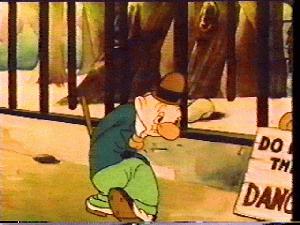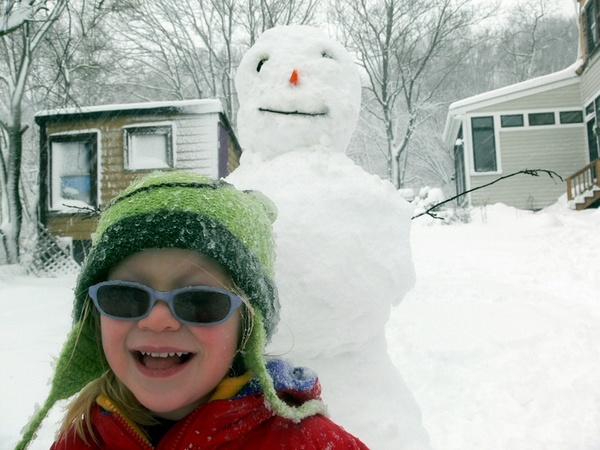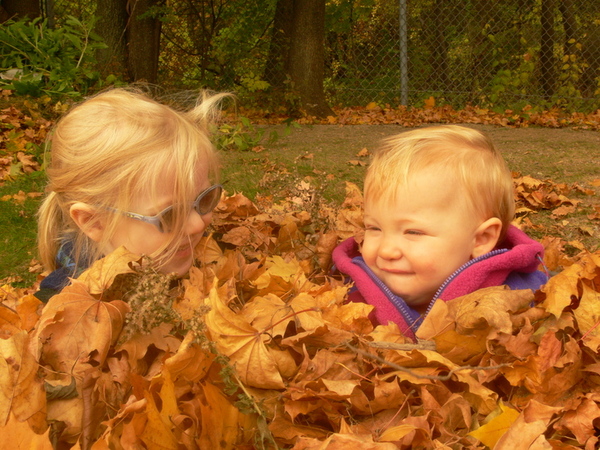Best Reason to Have More Than One Child
…so that you will eventually know the indescribable joy of finding all of them sound asleep at a reasonably early point in the evening.
Media for Kids

One great thing about kids — especially kids who have not been overexposed to TV media — is how easily entertained they are. We recently showed Esther some Looney Tunes cartoons from the 1940’s (on a real TV, no less!) and she couldn’t stop laughing. It is refreshing to see someone spellbound by animated content that didn’t require a rendering farm to create. I’m sure she’ll be jaded soon enough, but we’re trying to drag it out as long as possible by providing only very occasional small doses.
This piece on the end of reading as a cultural activity is chock full of interesting statistics. This excerpt, in particular, is relevant here:
In August, scientists at the University of Washington revealed that babies aged between eight and sixteen months know on average six to eight fewer words for every hour of baby DVDs and videos they watch daily. A 2005 study in Northern California found that a television in the bedroom lowered the standardized-test scores of third graders. And the conflict continues throughout a child’s development. In 2001, after analyzing data on more than a million students around the world, the researcher Micha Razel found “little room for doubt†that television worsened performance in reading, science, and math. The relationship wasn’t a straight line but “an inverted check markâ€: a small amount of television seemed to benefit children; more hurt. For nine-year-olds, the optimum was two hours a day; for seventeen-year-olds, half an hour. Razel guessed that the younger children were watching educational shows, and, indeed, researchers have shown that a five-year-old boy who watches “Sesame Street†is likely to have higher grades even in high school. Razel noted, however, that fifty-five per cent of students were exceeding their optimal viewing time by three hours a day, thereby lowering their academic achievement by roughly one grade level.
It certainly doesn’t surprise me that television–even educational TV–is generally not good for kids. The “inverted check mark” bit was a surprise, though. Who would guess that two hours a day is optimal for the nine-year-old brain?
On a related note, Kiddie Records Weekly (recommended by about.com here) is an astonishingly extensive source of free children’s books in MP3 format. It’s also an excellent example of the increasing relevance of bittorent in enabling wide economical distribution of legitimate content. The content is primarily (exclusively?) digitized vinyl records from the 1930’s and 1940’s. Fortunately, Alice in Wonderland gets no worse with age.
To complete the nostalgia circuit, who can forget “loaf of bread, a container of milk, and a stick of butter” (via sketchelement, quite a while ago):
[youtube]http://www.youtube.com/watch?v=HuESO65nPXY[/youtube]
These are good times to be a kid. Or maybe just to be a parent.
[Tags]Looney Tunes, Alice in Wonderland, Reading, TV, Cartoons, Sesame Street, Bittorrent[/Tags]
Success as a Parent
 Success as a parent is when your two year old recognizes and demands, at various times, Joni Mitchell, Paul McCartney (particular tracks), They Might Be Giants, and the White Stripes. And when she knows how to operate her own portable CD player and navigate your cell phone photo library.
Success as a parent is when your two year old recognizes and demands, at various times, Joni Mitchell, Paul McCartney (particular tracks), They Might Be Giants, and the White Stripes. And when she knows how to operate her own portable CD player and navigate your cell phone photo library.
These are skills that the Class of 2026 is going to need.
Growing Up on YouTube
My daughters are perhaps among the first who will grow up seeing much more YouTube than POTV (my newly coined acronym, “Plain Old TV.”) Esther, now 2½, has still never seen anything on a television (recorded, broadcast, or cable). (Havi, a week old today, may not have seen anything at all at this point.)
In addition to frequently watching videos from her own blog, Esther loves YouTube. Her most requested videos are embedded below, thanks to the excellent recently-installed Viper’s Video Quicktags.
Thus Esther may never know anything but on-demand and user-generated culture. At least those will be her basic assumptions about how it’s supposed to work. It’s possible that this next generation will spell the end of network-scheduled and traditional advertising-interrupted media. I can never understand why anyone would bother to arrange their schedule to watch a show on TV and sit through commercials when they can rent it from Netflix or buy it from Amazon or iTunes and watch it when and how they want — and I grew up, to some extent, with the old TV model. Esther can barely wait for whichever video she wants now. I can’t see her putting up with content on someone else’s schedule as she grows up.
Now the videos, as promised (both strong indicators that Esther adheres to the Long Tail theory):
[youtube]http://www.youtube.com/watch?v=8UMytSS9hx8[/youtube]
[youtube]http://www.youtube.com/watch?v=5-dATcjRrkg[/youtube]
Actually, it turns out I didn’t coin POTV. It’s already defined here.
[Tags]Culture, Kids, YouTube, UGC[/Tags]
More adventures in language acquistion
Esther turned two recently. She’s come a long way in language acquisition since January. Now she is a rich source of linguistics grammaticality problem sets:
Me: Do you want a hug?
Esther: Yes.Me: Big hug or little hug?
Esther: None hug.
And, this morning:
Me: What’s better, music or rugula?
Esther: Rugula and music.
(Note that “rugula” is not actually the longest word in her vocabulary — that would probably be “arboretum.”)
Our household’s technology focus is also apparent: any small hook-like device is an “email.” For example, a bluetooth headset and a refrigerator hook magnet are both emails. Shorthand for “another book” is “i-book.”
Ralph’s World, More Music For “Children”
For those who care about kids…
I recently blogged about TMBG’s marketing genius in releasing “kids’†albums that adults who grew up to TMBG will love and buy. Another good example of kids’ music that you, too, can enjoy is Ralph’s World. It’s not quite as ironic or odd as TMBG, but still a good listen. Check out, for example, the RealAudio clips for Clean-Up (much better than the Barney version!), Baa-Baa Black Sheep, and The Coffee Song.
Speaking of Barney, apparently his music has been used to torture Iraqi detainees.
[Tags]Children’s Music, Music[/Tags]

